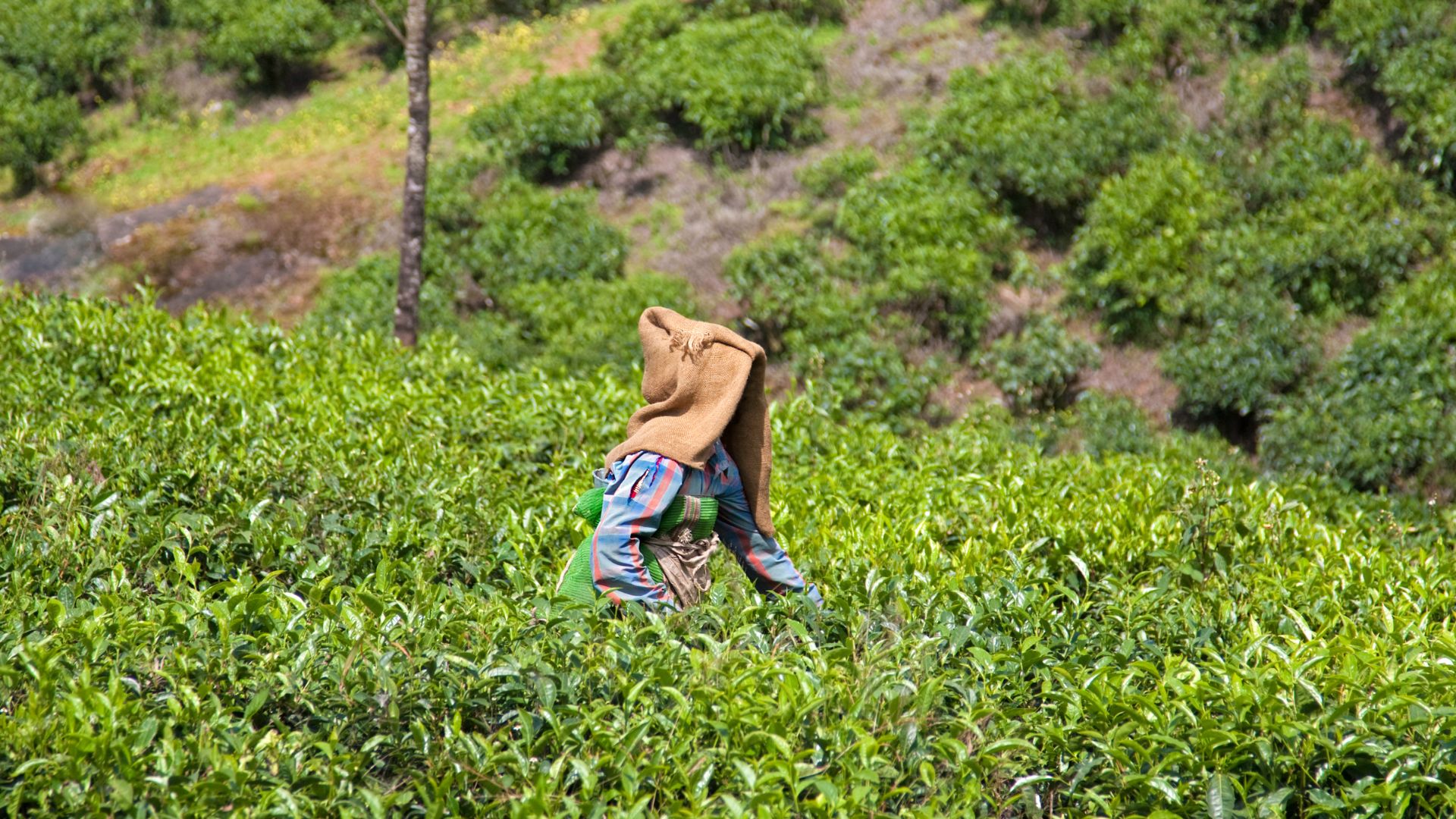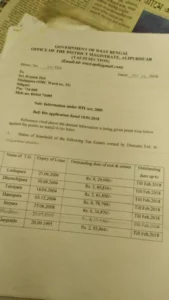Rupam Deb
This is the first in a two-part series on how workers, who have been toiling for decades in tea gardens, remain deprived of their basic rights and how the government’s lackadaisical attitude to this issue is further exacerbating their plight.
 Amal Kerketta, a worker at Sailee tea garden in the Jalpaiguri district of West Bengal, lives with his four sons and a daughter in a dilapidated estate quarter with two rooms. A year ago, his eldest son started expanding the house to make more room for the family, but he could not do so. On January 24, 2022, the estate manager interrupted and verbally instructed him not to build anything extra on the estate land.
Amal Kerketta, a worker at Sailee tea garden in the Jalpaiguri district of West Bengal, lives with his four sons and a daughter in a dilapidated estate quarter with two rooms. A year ago, his eldest son started expanding the house to make more room for the family, but he could not do so. On January 24, 2022, the estate manager interrupted and verbally instructed him not to build anything extra on the estate land.
In another estate, Gurjang Jhora, not far from the Sailee tea garden, Shanti Kerketta Oraon and Sunita Oraon are permanent workers on the plantation, last October, were expelled from their jobs by the management. Their crime? Building rooms on their homestead. Such incidents are not some unforeseen rare events in the tea gardens of North Bengal. “Our land rights have been deliberately withdrawn from us because having land rights will virtually end the current order, which is like slavery,” lambasts Christian Kharia, president of the North Bengal Tea Workers’ Organisation. “Our prime objective is to demand land rights,” he adds.
Interestingly, none of the management has given any written intimation that the workers have to forego their jobs for constructing a house on their homestead land. This is because the Tea Act of 1953 lays the real ownership of the tea land to the government, and companies are merely leaseholders.
The owners are obliged to report to the government if there are instances of new constructions or other ventures, however, they cannot expel someone from the garden.
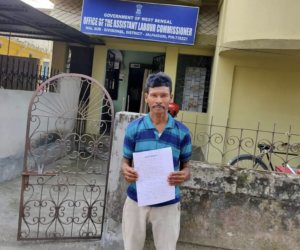
In the photo, Amal Kerketta at Malbazar Labour Department Office on 25/4/2022 with a case order for his reemployment with compensation. Photo Credits: East Mojo
Individuals like Christian Kharia are the face of a new generation that wants to live off their dreams not by working as a tea plucker but by pursuing other services or businesses. But even doing business inside the tea gardens seems a distant dream as the tea workers’ wage is so low (232/- per day). They are unable to get loans from the banks as they do not have any land ownership.
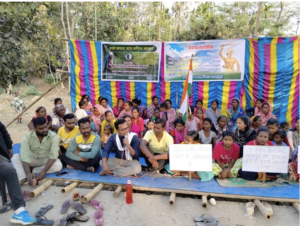
Christian Kharia with a mic demonstrating at Indong Tea Garden, Jalpaiguri, Photo Credits: East Mojo

Konika Dhanwar (Secretary, Madhu Bagan Multipurpose Cooperative Society), giving her lessons to one of the trainees at Madhu Tea Garden, Alipurduar.
Photo Credits: East Mojo
Konika Dhanwar, who runs the Madhubagan Multipurpose Cooperative Society in Madhu Tea Garden, says, “We are forming cooperatives to financially support ourselves so that we do not have to migrate to other states for jobs. To pursue government-sponsored livelihood programmes like animal husbandry, horticulture and kitchen gardening on a large scale and to move them commercially too, require huge tracts of land; and we lack this. That is why we have to start these programmes on a small scale. The state has minimum help to offer in this regard.”
Not far from Konika’s place lies Makrapara tea garden near the Bhutan border. The estate owner has started a huge piggery farm engaging large tracts of land. The workers of this estate allege that the piggery has been established after clearing tea bushes in a hushed-up manner.
No one is allowed to enter the farm and is on full-time vigilance and photography was prohibited. The Alipurduar Touji department (land is controlled by the Touzi office of the state land department) did not want to comment on this when we sought an answer.
The younger generation of Christian and Konika has emerged as the most active people to demand land rights in the tea gardens.
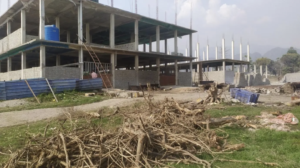
Makrapara tea garden near the Bhutan border, the owner of the estate has started a huge piggery farm illegally engaging large tracts of tea land. Photo Credits: East Mojo
Sanjay Bagchi, the Dooars Branch Indian Tea Association (DBITA) secretary could not comment “on how the government deals with the land issues.” “If someone illegally starts construction in our leasehold land then we are bound to take action,” he said.
When asked about the problems faced by the new generation, Bagchi told us that it is not in the hands of “the industrialists to solve problems like these. Government has not seized the land we got on lease. Others are using this to fulfil their other business plans, and they do not want to work in the tea garden anymore. This becomes so contradictory, even more so by using medical and water facilities provided by us.”
Legal rights activist and advocate Navin Kerketta, fighting for tea garden land rights for a long time and simultaneously spreading awareness among the workers, commented on the statement given by Bagchi, saying “The Adivasis have two hundred years of history in this area; the Plantation Labour Act of 1951 obliged the owners to provide living quarters to their workers. But even before that, the workers were providing themselves with shelter to live. The government knew that the owners were not providing housing to their workers and here, the government further made a mistake by leasing out the household (colony) land to the companies at a bare minimum price. It was never thought about those people who were not the workers residing inside the garden; even the refugees in West Bengal get land rights but Adivasis don’t. This is all happening because they want to make a slave out of these people.”
Hanging on to the owners’ comment, Navin adds, “If this issue has to be challenged legally, then the government will go on its back foot because it is spending billions of money on housing schemes through the local Panchayati system, and that is happening on the leased out land. As per the Plantation Labour Act, 1951 guidelines where the owners are to work on providing various facilities to the workers like health and water, there the government comes forward and spends billions. The government was supposed to collect revenues out of the leased land; ironically it is spending its funds on the same. This is in fact, a state-sponsored corporate loot.”
Navin’s comments are also backed by the RTI report filed by this author, which shows most tea gardens evade their land taxes towards the state government.
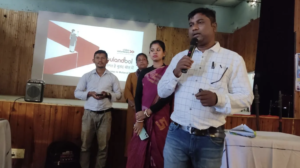
Legal rights activist and advocate Navin Kerketta, who is legally fighting for tea garden land rights for a long time. Photo Credits: East Mojo
The Waste Land Rules were introduced by the European Tea Planters in 1838 and was reformed in 1854. The previous lease allotment of 45 years was increased to 99 years by the reform. The land allotment was also increased to 500 acres from 100 acres. Each applicant was required to have a capital stock of Rs. 3 per acre according to the rule. After the Independence the State Acquisition Act and the West Bengal Land Reforms Law were passed in 1953 and 1955 respectively; based on these two rules the government took over the tea estate land and leased out for 30 years.
Dooars, Terai and Darjeeling regions have around 377 big tea plantations with an acreage of 1,14,848 hectares where approx. 3,40,635 workers are employed.
A few thousand hectares of North Bengal land are under the tea companies, and the matters related to the land are controlled by the Touzi office of the state land department. The government leases out tea garden land for thirty years for a certain amount of taxes. The renewal of the lease requires a payment of Rs. 9000 per acre of salami in seven instalments. For the sick gardens, the salami stands per acre at Rs. 6500. Additionally, the annual rent per acre stands @Rs. 30 upon which a 75 per cent cess is laid. A total amount of Rs. 52.50 per acre has to be paid to the government in two instalments.
It has come to notice that in Jalpaiguri many tea gardens belonging to Goodricke have not renewed their lease, and those still possessing leases have their salami dues crossed over five crores of rupees. In Alipurduar, Goodricke’s two other tea gardens Kumargram and Sankosh, have not renewed their land leases since 2000 and 2006 respectively. A few years back, McLeod Russell Company’s tea garden Bhatpara was sold to another owner. The same company abandoned the tea garden without paying their salami due of Rs. 55, 03,425. All this information procured through the RTI reports leads us to one question – if highly graded tea companies like the Goodricke and McLeod Russell evade their land taxes, how do the other sickly tea gardens fare on this? For example, an RTI report of February 2018 tells us that in Alipurduar the Duncans Company owed Rs. 75, 0970, 22 to the government as rent cess for seven tea gardens.
Anuradha Talwar, a social activist and the state committee member of Paschim Banga Khet Majur Samiti commented on this context “Most of the gardens that are reopening do not possess lease documents, and the government is the first agent to know which garden will turn into a sick one as the owners stop paying rent as the initial sign of the sickness. The tea gardens would not have been in today’s condition had the government taken immediate action then.”
Many of the tea garden owners complain of high land taxes imposed on them by the government as a result they are unable to clear the dues. If the owners think that they are overburdened by the land tax, why do they keep paying rent for the labour lines which come outside of the plantation area? Would it not be an apt decision for the owners not to pay the rent for areas outside of the plantation and the factory? However, there are two reasons why this might not be possible. One, most of the owners show the tea land to procure a bank loan for reinvestment but illegally siphon off those funds to their other businesses or ventures. And, two, if the tea garden workers are to work in such hard and underpaid conditions, they have to be bound under some vague legal matters like land rights; no land rights meaning bound to the company.
Conspicuously, not only the tea garden dwellers but the small towns and the settlements in and around the tea plantation too have been enmeshed in this colonially based economy. They too, cannot get loans from the banks, not even think of an alternative industry, all because of the land rights issue.
The Chief Minister in her visit to Dooars on January 19 this year, announced that the workers would soon be provided land patta. On February 17, the state government acquired 584.193 acres leased out lands under the West Bengal Estate Acquisition Act of 1953, section 6(3). Again, based on the West Bengal Land Reforms Act, 1955, Chapter VI section 49, a few selected tea garden workers were allotted plots of land ranging from 5 to 8 decimals. This sort of spontaneous decisions and actions from the state government has given room for many questions and uncertainties in the minds of the workers, and social and political thinkers alike.
This article is published as a part of the Smitu Kothari Fellowship of the Centre for Financial Accountability, Delhi.
This article was originally published in East Mojo and can be read here.
Centre for Financial Accountability is now on Telegram. Click here to join our Telegram channel and stay tuned to the latest updates and insights on the economy and finance.

